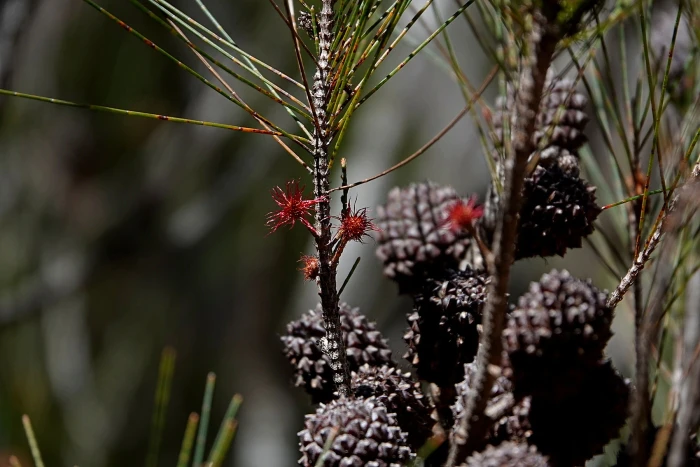Black She-Oak
(Allocasuarina littoralis)
Black She-Oak (Allocasuarina littoralis)
/
/

Max Campbell
CC BY 4.0
Image By:
Max Campbell
Recorded By:
Copyright:
CC BY 4.0
Copyright Notice:
Photo by: Max Campbell | License Type: CC BY 4.0 | License URL: http://creativecommons.org/licenses/by/4.0/ | Rights Holder: Max Campbell | Publisher: iNaturalist | Date Created: 2022-09-17T13:31:22-07:00 |


















Estimated Native Range
Climate Requirements for Carney, Maryland
| This Plant | Your Site | Plant Suitability for Your Location | ||
|---|---|---|---|---|
| • Precipitation | 10" - 300" | 45" | Aquatic | Aquatic |
| • High Temp. | 61°F - 101°F | 86°F | Your summer temperatures are normal for this plant. | Excellent |
| • Low Temp. | 28°F - 72°F | 25°F | Your winter temperatures may be too cold for this plant | Too cold |
This plant may not grow well at your location - your precipitation is too high.
Summary
Allocasuarina littoralis, commonly known as Black She-oak, is a dioecious or less commonly monoecious tree or shrub, native to open woodlands and forest margins in eastern Australia. It typically grows to a height of 16-49 feet (5-15 meters) and has a distinctive slender, conical form. The foliage consists of fine, needle-like branchlets that resemble pine needles, giving it a soft, fine texture from a distance. These branchlets bear small, scale-like leaves arranged in whorls. The Black She-oak is notable for its ability to fix atmospheric nitrogen through a symbiotic relationship with root nodules, which enhances soil fertility.
Black She-oak is valued for its hardiness and ability to thrive in poor soils, making it useful for reforestation projects and erosion control. It is also planted as an ornamental tree for its unique texture and form. In cultivation, it prefers full sun to light shade, tolerates a range of soil types, and requires little water once established, making it a low-maintenance choice for xeriscaping. It produces small, reddish-brown cones and has a moderate growth rate. However, gardeners should be aware of its potential invasiveness outside its native range and check local regulations before planting.CC BY-SA 4.0
Black She-oak is valued for its hardiness and ability to thrive in poor soils, making it useful for reforestation projects and erosion control. It is also planted as an ornamental tree for its unique texture and form. In cultivation, it prefers full sun to light shade, tolerates a range of soil types, and requires little water once established, making it a low-maintenance choice for xeriscaping. It produces small, reddish-brown cones and has a moderate growth rate. However, gardeners should be aware of its potential invasiveness outside its native range and check local regulations before planting.CC BY-SA 4.0
Plant Description
- Plant Type: Tree
- Height: 16-30 feet
- Width: 4-5 feet
- Growth Rate: Moderate
- Flower Color: Brown, Red
- Flowering Season: Spring, Summer
- Leaf Retention: Evergreen
Growth Requirements
- Sun: Full Sun
- Water: Low
- Drainage: Fast, Medium
Common Uses
Drought Tolerant, Erosion Control, Fire Resistant, Hedges, Low Maintenance
Natural Habitat
Native to open woodlands and forest margins in eastern Australia
Other Names
Common Names: Australian Pine, Bull-Oak, River Black-Oak
Scientific Names: Allocasuarina littoralis, Casuarina elegans, Casuarina filiformis, Casuarina leptoclada, Casuarina littoralis, Casuarina miquelii, Casuarina miquelii, Casuarina moesta, Casuarina moesta
GBIF Accepted Name: Allocasuarina littoralis